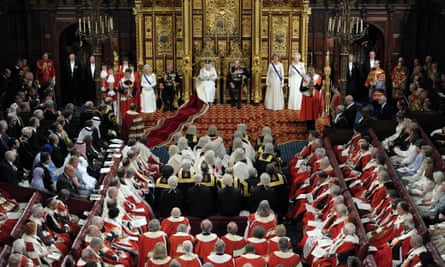Ah, Queen’s speech day again. The streets between Buckingham Palace and the medieval royal palace across St James’s Park at Westminster have been tidied and, in some cases, closed to traffic. Canopies have been erected in case of republican rain, crush barriers put up to hold back London’s summer tourist hordes as the Queen’s fairy coach passes with that speech on her iPad.
All this used to happen in wet November (Guy Fawkes, that 17th-century al-Qaida foot soldier planned to light the blue touchpaper on the 5 November), but changing legislative habits, spring elections and coalition imperatives have pushed it into glorious spring. Lucky tourists.
But changing habits also reflect changing attitudes within the Queen’s own realm. How long can this elaborate, distinctly camp, feathered flummery continue if it no longer resonates with the wider public, anxious about job insecurity or indifferent to hollowed-out post-imperial pomp? I don’t claim to know the answer, but the question is worth asking.
When Queen Victoria celebrated her diamond jubilee in 1897, Britain still saw itself as the world’s leading power, though the writing was on the wall in both German and American. Taciturn George V was touched by public affection (“I didn’t know they cared”) during his silver jubilee in 1935, our own Queen got a good show of street parties in 1977, less so in soggy 2012.
But whenever it feels that the public romance with royalty – never remotely universal (republicanism surged during Victoria’s decades of mourning for bossy Albert) – is fading to the point of irrelevance, something happens to question secular and progressive assumptions.
Princess Diana was adored, her not-so-effortless empathy (what do you do on meeting an Aids sufferer? You hug them) rightly admired, her private tragedy the stuff of operas not yet written. A global figure then, and one whose death confirmed her myth. Her funeral in the same streets as today’s events was a brilliantly staged pageant (lovely weather again) with added, unscripted drama from her brother – and citizens of all ages and races who threw flowers on the hearse.
Top that if you can, said the progressives in 2002, when the Queen Mum died at 101. But to their surprise, thousands filed past her coffin in Westminster Hall, much as they had for her husband 50 years earlier. It wasn’t a Diana moment, but it was decent and respectful. No one threw affectionate gin bottles at the cortege. Hadn’t the King and Queen stayed in London during the Blitz and their home been bombed too?
Actually, they mostly slept at Windsor, but it was a shrewd display of solidarity, a nimble bit of footwork which the stuffy House of Windsor and its advisers continue to display when the royal back is against the wall. At 18, Princess Elizabeth joined the army, something Margaret Thatcher ducked at the same age.
For a PR comeback, how about that 2002 “party at the palace”, eh ? Or Charlie Windsor’s handshake with sulphurous Gerry Adams? Even an old leftie like Alex Salmond feels the need to big up the passion for the turf he shares with Her Maj. There’s still something barely tangible there, mysterious, counterintuitive, even spiritual that means a lot to many people.
And yet you can’t help feeling that the magnetic field of monarchy is weakening. How many schoolchildren are taught what today’s annual trip to parliament means in historical terms or why MPs troop off to the Lords? (monarchs have not been allowed in the Commons since Charles I’s failed coup there in 1641).

Are the kids taught about the long struggle between monarch, aristocracy, church and people which – so the long-treasured Whig interpretation of progressive history had us believe – ended in the triumph of accountable popular democracy, the apolitical monarch merely the figurehead, the symbol of national unity: her government, courts and armed forces, if not her oligarchs and footloose Canary Wharf bankers?
If people don’t understand the meaning behind the symbolism that justifies the feathers and ermine, the gold and the pomp, they will soon cease to tolerate it as an occasional irritant that holds up the traffic in central London. And the symbolism has been steadily hollowed out for decades.
In our own time, Labour got rid of all but 92 hereditary peers who sat in the Lords, a significant diminution of the old ruling and landed class which is fast retreating to its estates as it has done over most of old Europe, hanging on as best it can, successfully in some cases.
Even a cut-price toff like David Cameron expediently modified the vestigial royal prerogative via the Fixed Term Parliaments Act, abolishing her symbolic power to dissolve parliament and trigger an election – nowadays he tells her, he doesn’t ask. Small stuff, but all part of the unwinding of the monarchical legacy of ages past.
I noticed another manifestation when newly elected MPs turned up to swear the ritual oath of allegiance (and thereby qualify for salaries) the other day. Part of the ritual is that a Lords official called Black Rod (is it a job or something contagious?) arrives to summon them to the “other place” along the gilded corridors. Not even I can remember why. As Cameron led the frontbenchers I was struck by how few backbenchers, even Tories, joined him on the walk.
In the old days, Labour’s magnificently unclubbable Dennis Skinner would have stayed put, accompanied by a few pals from the Awkward Squad. Now it’s a bigger cross-party posse that includes most of the 56-member SNP contingent. Many MPs are privately republican (I suspect Ukip’s Douglas Carswell is one of them), just as many are atheist – another broken link with the state church and its head.
A government with some spare time should stage a national conversation about this, perhaps as part of the wider constitutional review which Cameron has promised to modernise our flexible but improvised arrangements which have endured so long. Otherwise it will be done in haste in a crisis or botched for other reasons, perhaps after a miscalculated referendum on the very existence of the monarchy which many republicans would like to see when the Queen dies. Perhaps there will be a British compromise around a scaled-down royal family.
“Dies”? Am I allowed to say that? As in most families, the unavoidable is usually deployed in euphemistic terms. But it will happen, though not before the doughty sovereign overtakes Queen Victoria to become our longest-reigning monarch. She has been shrewd, mostly silent and unshowy, dutiful and always dignified.
So she will deserve and receive a good send-off, organised by the same Sir Alan FitzTightlys who have organised Wednesday’s pageant. Some men love an excuse for dressing up. But after that, who knows? I regard Britain as a crowned republic, one with a hereditary president, our collective staff, not our rulers.
It seems to work well enough, at far lower cost than a subscription to Sky Sport. Others feel passionately that it is the keystone of privilege that must be torn down. A naive analysis, in my view, albeit keenly felt, especially among the progressive bourgeoisie. But the most insidious threat to clumsy Charlie Windsor’s lifelong mission to become Charles III is public indifference.
So enjoy today’s OTT pomp if it rocks your boat. There may not be too many more. If David Attenborough ever has to deliver the President’s speech, I don’t think he’ll use that gold coach.

